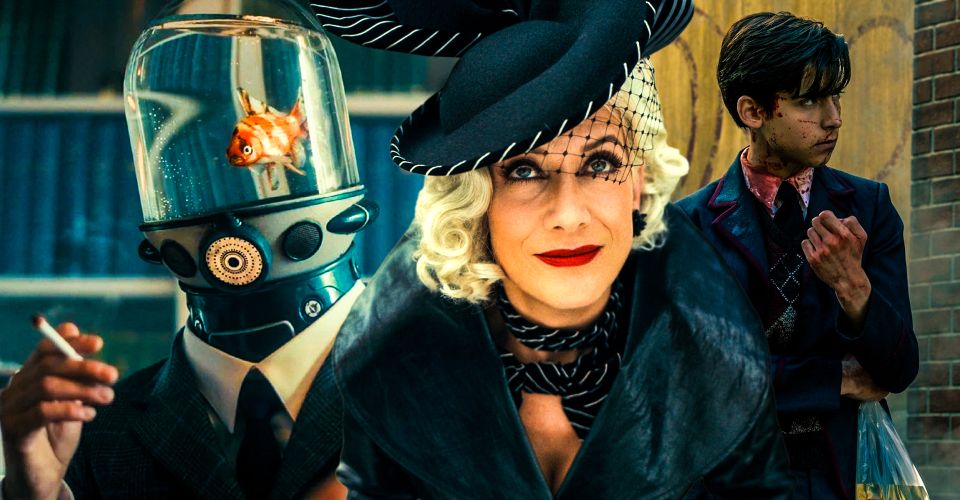Umbrella Academy: Why The Show Changed Carmichael’s Death

In The Umbrella Academy, the Handler eats the Commission’s goldfish director, marking a change from the comics, in which Five kills Carmichael. Based on the comic books by Gerard Way and Gabriel Bá, the Netflix Original The Umbrella Academy follows a group of seven superpowered foster siblings as they contend with bizarre threats to humanity as well as with their own personal dysfunction. The Umbrella Academy season 2 loosely approximates the second limited series, Dallas, which revolves ostensibly around the Kennedy assassination, an apocalypse, and the Hargreeves siblings’ roles in both.
In the surreal science fantasy of The Umbrella Academy, the integrity of the timeline seems to be looked after by a group called the Temps Commission, which remains enigmatic while still maintaining an atmosphere of retro mundanity. They employ Five for much of his life after he becomes trapped in the future, making use of his innate time-traveling abilities. Despite its monolithic name, the Commission in The Umbrella Academy is far from static, and a power struggle occurs in the organization during season 2 between the revenant Handler and the Board of Directors, headed by a posh goldfish of genius-level intelligence named A.J. Carmichael.
After decimating the Board of Directors, Five brings a de-suited Carmichael to the Handler, who then eats the fish, partially to keep him from talking and partially to truly usurp his position. However, in the comic books, it is Five that eats Carmichael, as retribution for his mistreatment by the Commission. The Umbrella Academy series, while inarguably eccentric, is less stylized than the comic books and in many places reins in its source material. To that end, in much the same way that Hazel and Cha Cha are humanized through their storylines in season 1, this change makes Five seem slightly less unhinged. And given the intensity of his slaughter of the Board, which serves as something of a replacement, such an adjustment was likely needed in order to maintain his relatability as a protagonist.

Five’s character may also be better off having this moment appropriated from him for another reason: his specific grievance from the comics (i.e., that his DNA was altered by Carmichael) has not yet been mentioned in the show, so he had less motivation to kill the fish; indeed, given the fact that Carmichael was framed by the Handler as complicit in the murder of Lila Pitts’ parents, the show’s version of the character seems much farther removed from blame than his comic book counterpart. This then conveniently supports the choice to make the actively-sinister Handler the one to kill him, as she did not appear in the comics and as such the show needed a way to establish the true threat that she poses. Relatedly, it is also worth noting that Lila is another character who is unique to the Netflix adaptation, and the Handler’s desire to keep her in the dark prompted Carmichael’s undignified end, further justifying the change.
Perhaps because Way and Bá are both involved as executive producers, The Umbrella Academy has shown a great willingness to take liberties with its source material, retooling the story to better suit the medium of television. The particular change of making the Handler Carmichael’s killer instead of Five exemplifies the show’s intention to be an ensemble piece, spreading out characters’ actions from the comic books, adding strange new intricacies and harmonic resonances in the process. And while some revelations, such Sir Reginald Hargreeves’ extraterrestrial nature, may be slightly more jarring as a result, Netflix’s The Umbrella Academy has certainly shown that it can stand confidently on its own weird two feet, just as its comic book inspiration could.

















